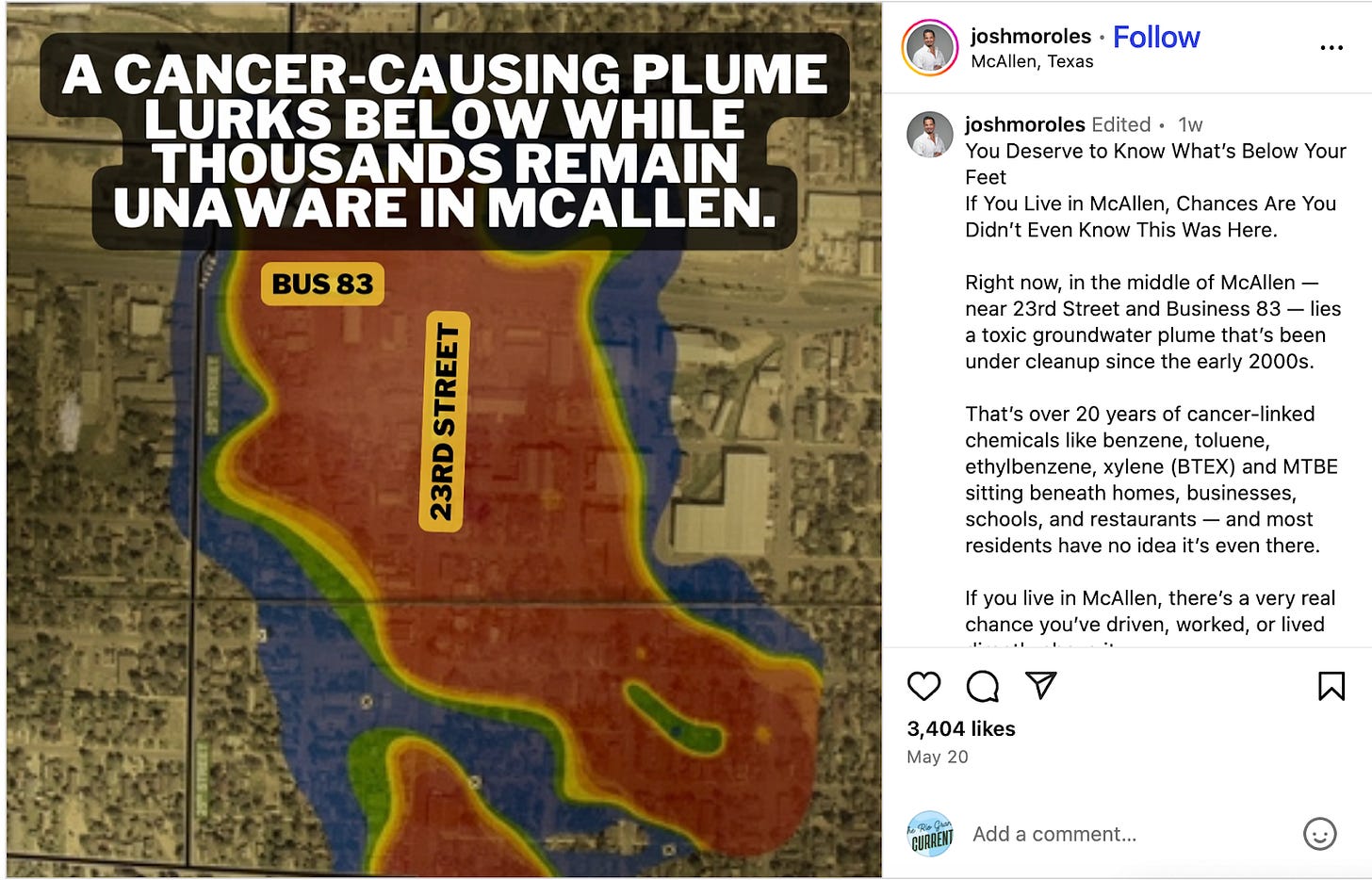Buried Hazards: What a Toxic Site in McAllen Tells Us About Environmental Neglect
Toxic Truths: How South Texas Was Left Behind — Part 1
"We didn’t know what we were breathing. We didn’t know what was under our homes. Now I’m scared it’s too late." — Resident testimony, Contaminación Collection, UTRGV
In the heart of McAllen, Texas, near the busy intersection of 23rd Street and Business 83, lies an invisible threat that’s been poisoning the ground for decades. Beneath the homes, small businesses, and churches of this working-class neighborhood, a toxic groundwater plume has spread—silently endangering the health of hundreds.
The Texas Commission on Environmental Quality (TCEQ) officially designated this site as the 23rd Street Groundwater Plume, encompassing nearly 33 acres. The primary culprits: benzene, toluene, ethylbenzene, and xylene—known as BTEX compounds. These are volatile organic compounds often linked to gasoline leaks and industrial runoff. Benzene alone is a known carcinogen.
What Lies Beneath
According to TCEQ reports, the contamination stretches from Cedar Avenue in the north to Fresno Avenue in the south, bordered east to west by 21st and 25th Streets. The contamination likely began decades ago, with multiple culprits: leaking underground fuel tanks, old train tracks, and deteriorating pipelines.
"The old Coastal Mart was responsible for a 37,000-gallon fuel leak. Add in the Union Pacific trains and broken pipelines—it’s a toxic cocktail under our feet." — Community source, McAllen
Despite state monitoring efforts since the 1990s, significant remediation didn’t begin until 2009. Even today, the cleanup remains incomplete, and residents say they were never properly warned.
Health Impacts You Can’t Ignore
This isn’t just about contaminated groundwater—it’s about what happens when it seeps into our lives. Through a process known as vapor intrusion, these toxic fumes can rise through the soil and enter homes. Children may play on carpets where benzene vapor lingers, or drink water unknowingly mixed with fuel residue.
"Our daughter got leukemia. We thought it was just bad luck. Then we heard about the plume." — Anonymous family, McAllen (via Texas Sharon’s Bluedaze)
According to the Contaminación Collection at the University of Texas Rio Grande Valley, over 180 families have reported illnesses including cancer, autoimmune disorders, and reproductive issues. A Texas A&M study found elevated levels of lead and arsenic in drinking water in nearby Alamo and Progreso—underscoring how widespread contamination in the Valley has become.
Environmental Neglect in Plain Sight
While TCEQ uses language like "monitoring wells" and "risk-based exposure," these terms hide the human cost. Families in this majority Mexican American neighborhood were never given the tools or data to protect themselves. There was no door-to-door education, no free health screenings, no relocation support.
"If this had happened in Highland Park, they would’ve cleaned it up yesterday." — Joshua Moroles, environmental activist, in The Environmental Crisis in the RGV
What Needs to Happen
This story is the first in a three-part series on environmental injustice in South Texas. What’s happening in McAllen is not an isolated incident—it’s part of a larger pattern of contamination, deregulation, and neglect. To move forward, we must:
Accelerate Cleanup: The TCEQ must set deadlines and prioritize full remediation.
Support Affected Families: Offer bilingual health clinics, vapor testing kits, and long-term tracking.
Create Oversight: Form an independent advisory board that includes residents and environmental scientists.
Reform Notification Policies: Require proactive alerts and data transparency for all contamination zones.
Next week’s Part 2 will explore how water contamination has been linked to dementia, autism, and generational illness—with stories from Starr County, data from Hidalgo County, and findings from national research.
📨 Stay Informed and Demand Accountability
If you live near the 23rd Street Groundwater Plume or simply care about environmental justice in South Texas, here’s how to take action:
Contact the Texas Commission on Environmental Quality (TCEQ):
Email: info@tceq.texas.gov
Phone: 512-239-1000
Website: www.tceq.texas.gov
You can ask to receive updates, submit public comments, or file a formal inquiry about the 23rd Street site (Site No. 108154). Use this subject line:
Concern Regarding 23rd Street Groundwater Plume – Request for Information
Here’s a sample message you can use:
To whom it may concern,
I am writing as a concerned resident to request updated information regarding the status of the 23rd Street Groundwater Plume (Site No. 108154) in McAllen, Texas. I would like to know the current remediation timeline, any health and safety advisories issued to residents, and what public outreach or testing is being conducted in affected areas. Please include any documentation available in English and Spanish.
Thank you,
[Your Name]
[City, ZIP Code]
Sources
Texas Commission on Environmental Quality (2024), 23rd Street Site Details
KRGV (2024), "McAllen Groundwater Contamination Cleanup"
UTRGV, Contaminación Collection
Texas Sharon’s Bluedaze
Texas A&M Study (2025), Alamo and Progreso Water Report
Joshua Moroles, Medium.com (2024), "The Environmental Crisis in the Rio Grande Valley"







If you’re into environmental health, my Mold & Corruption substack may be of interest to you
ThankYou for A&M. UT. Environmental
Concerns